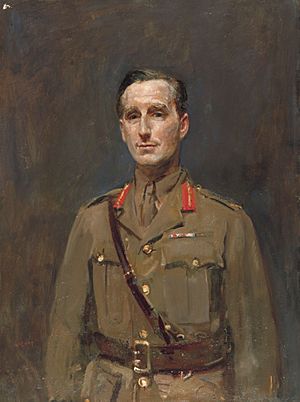Arthur Asquith facts for kids
Quick facts for kids
Arthur Melland Asquith
DSO & Two Bars
|
|
|---|---|

Brigadier General Arthur M. Asquith (Ambrose McEvoy, 1918)
|
|
| Born | 24 April 1883 |
| Died | 25 August 1939 (aged 56) Devon, England |
| Allegiance | United Kingdom |
| Service/ |
Royal Navy |
| Years of service | 1914–1917 |
| Rank | Brigadier General |
| Unit | Royal Naval Division |
| Commands held | 189th Brigade, 63rd Division |
| Battles/wars | First World War |
| Awards | Distinguished Service Order & Two Bars Mentioned in Despatches Croix de guerre (France) |
| Relations |
|
Brigadier General The Honourable Arthur Melland Asquith (born April 24, 1883 – died August 25, 1939) was a brave officer in the Royal Naval Division. This was a special group of Royal Navy sailors who fought on land with the British Army during the First World War.
Arthur Asquith's father, H. H. Asquith, was the British Prime Minister for the first three years of the war. Arthur himself was wounded four times during the war. He received the Distinguished Service Order three times for his amazing bravery. In December 1917, he was badly hurt and had to have one of his legs removed. After this, he retired from the military.
Contents
Early Life and Education
Arthur Asquith was born in 1883. He was the third son of H. H. Asquith, who later became a very important politician. Arthur's mother, Helen Melland, passed away when he was only seven years old.
He went to Winchester College for school, just like his brothers. After that, he studied at New College, Oxford university. Once he finished his studies, Arthur worked for a trading company called Franklin & Herrera. This job took him to Argentina for a lot of business.
Military Service in World War I
When the First World War began in 1914, Arthur Asquith immediately left his job. He felt he couldn't just "sit quietly by" while the war was happening. So, he joined the Royal Navy. His older brothers also joined the military.
The Royal Navy had many new recruits, so they created a special group called the Royal Naval Division. This group was sent to fight on land. Arthur Asquith joined them as a junior officer.
Fighting in Belgium and Gallipoli
The Royal Naval Division faced tough battles in the Siege of Antwerp in Belgium. They had many casualties but were pulled out before the city fell. In 1915, the division moved to the Mediterranean Sea to fight in the Gallipoli campaign.
During the Gallipoli Campaign, Arthur Asquith showed great courage. He was awarded the Distinguished Service Order (DSO) for his actions. However, he was also wounded, which meant he had to take a break from front-line fighting.
Western Front and Serious Injury
In 1916, the Royal Naval Division, now called the 63rd Division, moved to the Western Front. Arthur Asquith worked as a staff officer for a while. But in April 1917, because so many officers were lost, he took command of the 189th Brigade.
He led his troops through very heavy fighting that year. He earned two more Bars to his DSO, showing his continued bravery. He was also wounded two more times during this period.
On December 17, 1917, Arthur Asquith was very seriously wounded. He had to be sent back to Britain for treatment. Despite many surgeries, his leg had to be removed in January 1918. This injury meant he had to retire from the military as a brigadier general. After leaving the Navy, he worked for the Ministry of Munitions for the rest of the war.
Personal Life
On April 30, 1918, just four months after his injury, Arthur Asquith married Betty Constance Manners. They had four daughters together.
Later Years
After the war ended, Arthur Asquith led the group that created the Royal Naval Division War Memorial in London. This memorial honors all those who served in the division. He also worked as a director for several companies.
Arthur Asquith passed away on August 25, 1939, at his home in Devon, England.

